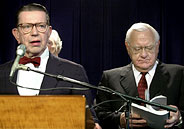
 |
CHICAGO, April 15 — The release of a landmark study of capital punishment in Illinois reignited debate today on one of the country's most contentious topics, with people on both sides saying the breadth of the proposed changes would severely reduce the number of death sentences, if not eliminate them.
Opponents of the death penalty embraced the study's 85 recommendations, made by a bipartisan commission, as evidence that abolishing capital punishment is more practical than trying to ensure it is administered fairly. Prosecutors, meanwhile, denounced the commission for skirting the question of whether the 160 people now on death row in Illinois should be executed and said the laundry list of changes would leave heinous killers unpunished.
Gov. George Ryan, who appointed the 14 members of the commission after declaring a halt to executions two years ago, accepted the report this afternoon, flipped through its 207 pages and said he would spend weeks or months reviewing it before determining the fate of the condemned.
"I'm not going to act in haste, I'm going to deliberate," Mr. Ryan said at a news conference where advocates held signs saying "Abolish the Death Penalty" behind a phalanx of television cameras. "I'll do what I think is right, and what we have to do based on this commission's work."
 Associated Press Gov. George Ryan of Illinois scanned the death penalty report Monday as former Senator Paul Simon spoke for the panel that produced it. |
The report lands at a challenging time, politically. The Illinois Legislature's spring session ends in a month and is expected to be dominated by negotiations to cover the budget shortfall. Mr. Ryan, the commission's champion, is a lame duck who opted against running for re-election and has been tarred by a political corruption scandal. In an election year, lawmakers are loath to approve expensive proposals, like those in the report, particularly if they can be perceived as soft on crime.
Regardless of when or whether the specific recommendations are adopted, experts said the report would reframe discussion. Already, Senator Russell D. Feingold, Democrat of Wisconsin, announced that his subcommittee on the Constitution would convene a hearing this spring to consider the findings.
Illinois has been a focal point of the capital punishment debate, in part because 13 death row prisoners have been exonerated since the state re-established capital punishment in 1997, and this report is the most thorough, independent analysis of the system to date. Nine other states have similar commissions; two have already released their reports.
"I think we're in the phase where we're making a policy determination, not so much a moral determination, but a practicality determination," said Richard C. Deiter, executive director of the Death Penalty Information Center in Washington. "This says it's going to be very difficult to have the death penalty that Americans want, which is one that doesn't risk innocent lives and is implemented fairly."
While the commission stopped short of calling for the abolition of the death penalty, the report acknowledged that a majority of members believed it should be stopped. In presenting the report, commission members said that without a complete overhaul, the capital punishment system could not be trusted.
"Repair or repeal," declared Thomas P. Sullivan, a former federal prosecutor in private practice, who was a co-chairman of the commission with former Senator Paul Simon and Frank McGarr, a former federal judge. "Fix the capital punishment system or abolish it," Mr. Sullivan said. "There is no other principled recourse."
Prosecutors said the proposals to videotape interrogations of suspects and establish a state panel to review decisions on whether to seek the death penalty undercut local authority and would be impractical. They were outraged at the proposed elimination of several categories of capital crimes, especially murder committed in the course of a felony. They scoffed at the need for an independent forensic laboratory.
"What this report does," said Kevin P. Lyons, the state's attorney in Peoria, "is brick by brick, stone by stone, rock by rock, place added burdens on the shoulders of every prosecutor so as to eventually say, `Oh, the heck with it.' "
Mr. Lyons added, "It clearly upsets the balance between protecting the rights of the accused and protecting the rights of the rest of us."
Joshua K. Marquis, a prosecutor from Astoria, Ore., who is on the board of the National District Attorneys Association, objected to the proposed prohibition on sentencing someone to death based solely on the testimony of a single eyewitness, a jail-house informer or an accomplice. He also said videotaping was impractical, noting that in his last capital case, one suspect made incriminating statements as he was being rescued from a fiery boat.
Death penalty opponents celebrated the commission's report but, in many cases, read it as a call for a permanent moratorium.
"The commission's recognition that no system can be devised to ensure that an innocent person would not be executed is strong support for replacement of the death penalty," the Illinois Coalition Against the Death Penalty said in a news release.
Amnesty International called on Mr. Ryan to extend the moratorium until all 85 recommendations are implemented and said the report "provides a profound rationale for abolishing the death penalty altogether."
Mr. Ryan acknowledged the tough political climate and huge budgetary hurdles the proposals faced but promised he would not be deterred from pursuing the commission's recommendations, if he accepted them.
"We're talking about life and death here," he said, "we're not talking about whether you win or lose an election."
![]()